The X Button
Classic Arrangements
by Todd Ciolek,

Last week was not pleasant. First LucasArts closed, which was a little sad. Then Roger Ebert passed away, which was a real loss. He was an inspiration to anyone who attempts critical thinking, and he wrote so much and so well that's hard to pick favorites out of his many essays, reviews, books, and TV spots.
With all that Ebert wrote about the cinema and other worthy subjects, it's a terrible shame that some chose to remember Ebert's contentious opinion of video games. To recap, Ebert felt that games couldn't be art in the same sense as a film, and he had good reason for that: due to their interactive nature, games don't allow the same authorial control as a movie.
This upset a number of people to the point where they mentioned it immediately after his passing, and that strikes me as not only tasteless but also irrelevant in the face of all that Ebert achieved in his career. At the most, the issue should be a minor point, and perhaps an example of just how esteemed he was in the realm of criticism. Why did Ebert's take on video games stick in so many craws? Because his opinion mattered. That's why.
NEWS
BLACK ROCK SHOOTER: THE GAME AIN'T CANCELED AFTER ALL
Black Rock Shooter: The Game was a large, mysterious blot in the middle of NIS America's release schedule for some time. Developer Imageepoch seemed intent on publishing the PSP title here shortly after it was released in Japan, but well over a year passed without much being said. In fact, the whole Black Rock Shooter franchise, spawned by an illustration from artist huke, slowed down a little bit in 2012. But perhaps it'll pick up when NISA at long last releases the game this April 23.
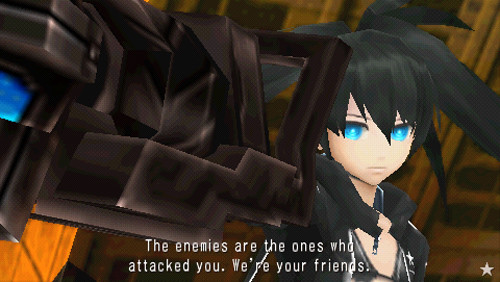
As you might guess, Black Rock Shooter: The Game isn't coming to America (and some European countries) in a big fancy premium box set like it had in Japan. It'll be just a downloadable title on the PlayStation Network for $19.99, compatible with the Vita as well as the PSP. And that's the best one can hope for in the current market.
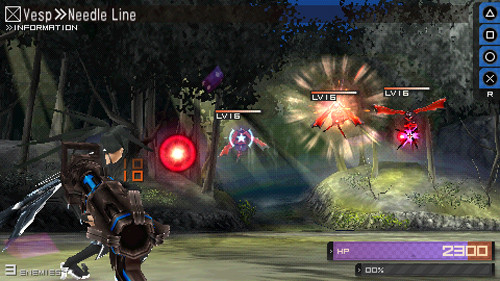
The game dumps Black Rock Shooter (or “BRS”) onto the alien-invaded Earth of 2032, and she's called on to defend the last surviving humans—all twelve of them. The game's technically an RPG, but it does its best to mimic a heated action title, particularly in the boss encounters. At the very least, a video game seems the right place for Black Rock Shooter's brand of stylized music-video chaos.
LUCASARTS CLOSES, FANS KINDA AMBIVALENT
It's certainly sad that Disney shut down LucasArts this past week. As with all shuttered developers, talented people are now out of work, and potentially interesting projects will go unfulfilled. Yet it's not quite as heartbreaking as it could have been, for this modern LucasArts wasn't the same creature that many of us knew and adored in the 1980s and 1990s. That breed of LucasArts was the premier creator of point-and-click adventure games, and anyone who grew up with a computer in the home was worse off if they couldn't enjoy Full Throttle, Sam and Max Hit the Road, Day of the Tentacle, Maniac Mansion, Zak McKraken and the Alien Mindbenders, the first two Monkey Island titles, or the high-water mark of the genre, Grim Fandango.
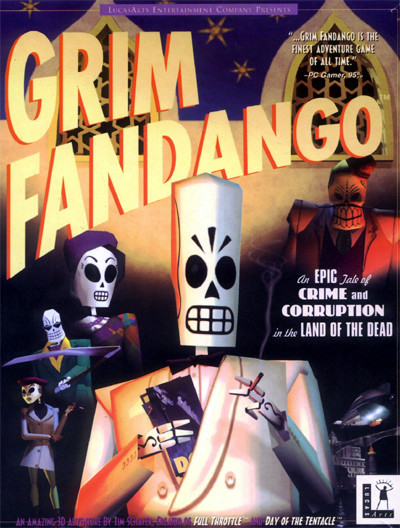
Sadly, LucasArts abandoned adventure games around 2003, when sequels to both Full Throttle and Sam and Max were canceled. Much of the talent behind the old LucasArts titles emigrated to Double Fine and Telltale Games, the latter of which even made some Sam and Max games. If the LucasArts of the adventure-game heyday is dead, it died years ago. And it came back to life somewhere else.
ANOTHER LOST MEGA MAN GAME REVEALED
I find myself continuously fascinated by how many video games live and die behind the scenes, often without their publishers even announcing them. For example, I was unaware that CAPCOM and Armature Studio were hard at work on a Mega Man X first-person shooter called Maverick Hunter.
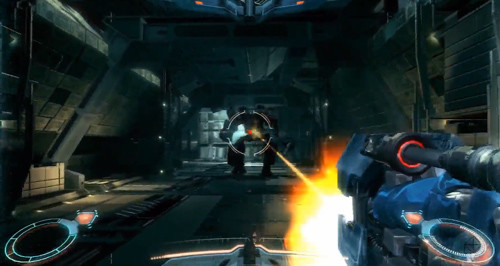
Polygon's article features footage of the game and describes its attempts to revitalize Mega Man with the industry's current favored genre. Mega Man caretaker Keiji Inafune came up with the idea, while Armature Studio took over the programming, design, and story. Maverick Hunter's resemblance to Metroid Prime is no accident; Armature was founded by folks from Prime developer Retro Studios, and they clearly wanted to give Mega Man the same 3-D revamp. The videos aren't all that impressive in their weapons and enemies, but it's nonetheless intriguing to think of how this new Mega Man might've fared in the market. I suspect it would've been better than Bomberman: Act Zero.
SPOTLIGHT: PS2 ON PSN
The PlayStation Network is doing well with its PSone Classics, original PlayStation titles that are priced low and made playable on the PS3, Vita, and PSP. It's allowed some enterprising publishers to release imports never before seen in North America, even if the PSN library remains a bit more robust in Japan (we still can't get Einhander over here). The PS2 Classics line hasn't won as much attention since its debut. The selection of titles is smaller, and no one's releasing lower-profile imports just yet. That said, there's plenty to be found for about ten bucks a game.
THE UNDERRATED
The best thing about the PS2 Classics series is the way it gives once-overlooked titles a second chance. Let's say you didn't buy Chulip when it first came out in 2007. The PlayStation 2 was overshadowed by newer systems at that point, and the whole idea of game based on friendship and kissing might've sounded too bizarre even for an offbeat Natsume release. Well, now you can try Chulip on the PlayStation Network.
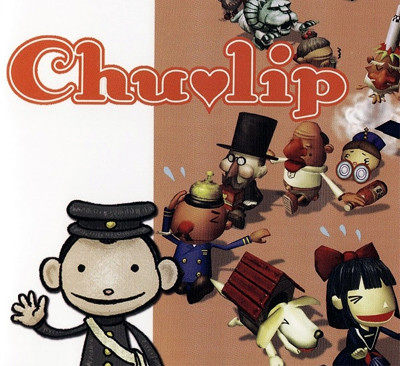
And you probably should try Chulip, because it's a unique and enjoyable thing. It finds a young man out to win over his crush with a love letter, but his journey leads through courtroom drama, alien encounters, and other strange subplots. He often progresses in his quest by kissing the various residents of his small town, and finding every possible target for his affection is a quest in itself. Chulip is the work of Yoshiro Kimura, formerly of Love-de-Lic, and the game's charming emphasis on social interaction resembles that developer's Moon: Remix RPG Adventure and L.O.L.: Lack of Love. Neither of those titles is available in North America, but Chulip is.
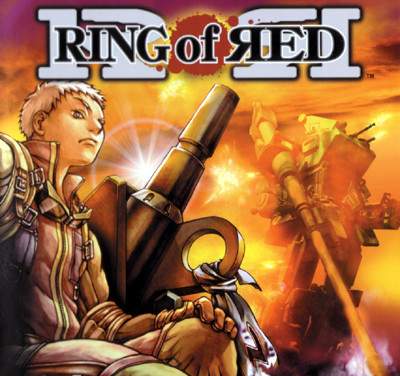
I often wondered why Ring of Red never caught on as a cult favorite. It was one of the best offerings of the PlayStation 2's first year, and it's staged in a novel alternate-history realm where the Soviets and the U.S. carved up Japan after World War II. Perhaps it demands a little too much; its strategy-RPG battles can take hours at a time, and each enemy encounter makes the player aim and wait for each shot. Yet it's all a compelling endeavor if you give it the time. The combat goes deeper and nastier than most of its genre, making you watch soldiers die defending the mechs you maneuver around a battlefield. The English version has awkward moments and some possibly justified censorship (several characters are former Nazis), but that takes away very little from the whole thing.
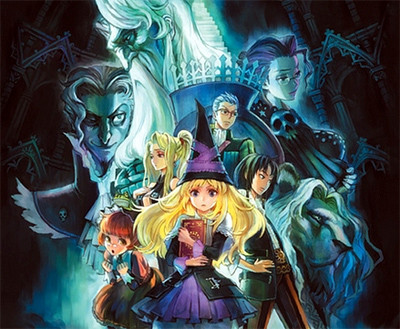
Vanillaware's GrimGrimoire had the rotten luck to arrive in North America just when everyone was paying attention to the developer's side-scroller Odin Sphere, which I still don't like no matter how pretty it is. In contrast to Odin Sphere's awkward action-RPG trappings, GrimGrimoire is a strategy-RPG with real-time progression, as players generate and command various familiars in open battle. These skirmishes propel student Lillet Blan through a magical academy where just about all of her classmates and professors are warped in some way. It's an amusing showcase for Vanillaware's typically beautiful 2-D animation, and it might assuage the developer's fans until Dragon's Crown arrives this summer.
OTHER SUGGESTIONS
God Hand might qualify as an underrated game, seeing as how it was released shortly before its developer, Clover, was shuttered by CAPCOM. Yet it's certainly appreciated today, as both critics and fans laud the game's detailed approach to the whole idea of brawlers. It's staged in a bleak world straight out of Fist of the North Star, but the clichés are all the playthings of a marvelous fighting system. When pounding a variety of goofball foes, players can use everything from a surprisingly intuitive dodging system to a roulette wheel of special moves, and the selection outclasses just about any brawler you could name. The humor comes just as crude as that of MadWorld or Anarchy Reigns (which Clover expats made after they regrouped as Platinum Games), though at least the tone's apparent from the first cutscene. A physical copy of God Hand is getting tougher to find, so there's no shame in grabbing it from the PSN.
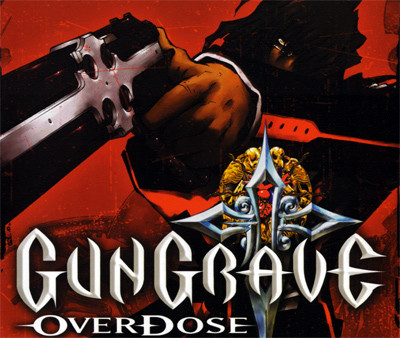
For those who like the sort of nonsensical excess seen in God Hand, there's similar stuff to be had in Gungrave: Overdose. The original Gungrave was an exercise in simple, mindless shooting, but the sequel…well, it's not that much more complex, but everything's done better. Aside from the lumbering zombie-gunman known as Beyond the Grave, players can also control the gunblade fighter Juji Kabane and his partner, the lightning-spewing Rocketbilly Redcadillac. It's as close as Yasuhiro Nightow's yet come to a Trigun follow-up.
Elsewhere in the PS2 Classic lineup, you'll find Nippon Ichi's original Disgaea and its underrated sequel, plus the developer's earliest foray into full strategy-RPGs, La Pucelle: Tactics. Also worth checking out is the survival-horror oddity Siren, which I've found particularly interesting after playing director Keiichirō Toyama's more recent Gravity Rush. For the Harvest Moon enthusiast, there's Innocent Life: A Futuristic Harvest Moon. Unlike the fantasy-themed Rune Factory, Innocent Life didn't spawn a sub-series all its own, so the game remains an intriguing look at how Harvest Moon might have evolved.
A number of popular PlayStation 2 games are also on hand in cheap reissued Classic form: Persona 3 FES, Maximo: Ghosts to Glory, Rygar: The Legendary Adventure, Sega's Shinobi reboot, the above-mentioned (and above-derided) Odin Sphere, and, most recently, the first Fatal Frame.
THE IMPORTS
Those who venture onto the Japanese and European versions of the PlayStation Network will find the PlayStation 2 Classics slightly different, if not superior. North America may be the only region to get Psychonauts, Chulip, and Grim Grimoire (and, for some reason, the lousy Raiden III), but Japan enjoys Katamari Damacy and Dark Cloud, while Europe has exclusives like Baroque, the second Maximo game, and Maken Shao: Demon Sword (a port of the Dreamcast's Maken X). Perhaps things will even out in the future, and perhaps we'll get a few PlayStation 2 titles that we never saw on store shelves here.
NEXT WEEK'S RELEASES
PANDORA'S TOWER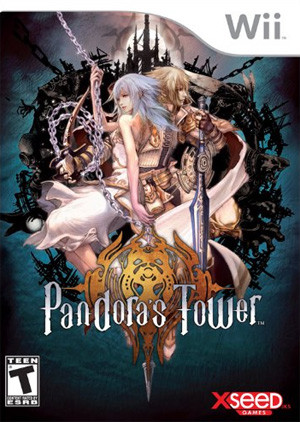 Developer: Ganbarion/Nintendo
Developer: Ganbarion/Nintendo Publisher: XSEED Games Platform: Wii Release date: April 16 MSRP: $39.99 Pandora's Tower almost skipped us. It arrived in Japan in 2011, and Nintendo of Europe released it roughly a year later. Here in America the game joined The Last Story and Xenoblade in a fan campaign called Operation Rainfall, but by the end of 2012 it seemed as though Pandora's Tower would go unpublished here. Few companies will bother with Wii games now that Wii U is out, right? Well, XSEED is one of those few companies, and they surprised even me by finishing out Pandora's Tower and making it the last notable Wii title for these shores. What made us clamor so for Pandora's Tower? Well, the premise grabs one's attention. A priestess named Elena finds herself cursed to turn into some hideous monster, so she and her boyfriend Aeron flee to a blighted wasteland where thirteen towers hang above a great chasm. They're guided there by Mavda, a wizened peddler who all-too-cheerfully explains that Elena can cure herself only by eating the flesh of each tower's beastly overseer. And so Aeron heads off to slay and harvest creatures for Elena's reluctant and eerie consumption. Aeron hacks his way through the towers with traditional swordplay and a mysteriously empowered chain that lets him ensnare and toss around enemies. It's a bit like a darker Zelda or a less sociopathic God of War, and there's some Shadow of the Colossus in the underlying themes; Aeron and Elena are dealing with dark forces in their desperate endeavors, and a warped legend lies behind everything. As Aeron treks through the towers, a gauge monitors just how Elena's condition worsens, and her curse will take over if she doesn't get fresh monster meals in time. In between these gruesome forays, Aeron chats with Elena, offers her gifts, and generally tries to take her mind off the fact that she's slowly turning into an unspeakable eldritch horror. The game's ending ultimately depends on the player's interactions with Elena and how quickly she's cured. Of course, you can get the worst conclusion by letting her mutate beyond redemption. I'm sure that many players will do just that the first chance they get. |
SHIN MEGAMI TENSEI: DEVIL SUMMONER: SOUL HACKERS Developer: Atlus
Developer: Atlus Publisher: Atlus Platform: Nintendo 3DS Release date: April 16 MSRP: $39.99 Why didn't Soul Hackers come out on the original PlayStation? Was it the game's vision quests? Or the whole idea of players summoning devils, as the title clearly states? Nah. Those were uncontroversial concepts in the PlayStation era, and all evidence suggests that Sony just didn't let Atlus translate the game. In fact, Sony did the same thing many years later, nixing a North American PSP version of the first Devil Summoner because it didn't have enough new content (similar nonsense led them to deny us the Suikoden double pack). But Soul Hackers doesn't need Sony's approval now that it's on the 3DS. As the second in the Devil Summoner spin-off series, Soul Hackers carries itself with a slightly more futuristic air than the typical Shin Megami Tensei title. It unfolds in the high-tech environs of Amami City, where the hottest thing going is a virtual-reality game called Paradigm X. The protagonist is a player-named lad who's nearly killed by some mysterious stranger during a Paradigm session, and he's left to uncover the mysteries behind the game's corporate sponsors. He's helped by a squad of hackers named the Spookies as well as some vagrant spirits, but his best ally is his childhood pal Hitomi—and the troublemaking demon Nemissa, who periodically possesses Hitomi and turns her hair a stylish white. Soul Hackers remains a dungeon-crawler in its 3DS form, with a first-person perspective and plenty of battles against various demons. As it's a Shin Megami Tensei piece, you aren't just slaying them for experience points. The hero packs a GUMP, a gun-shaped computer (hence the name) that allows him to converse with monsters, befriend them, and summon them later. These devils can be fused to create new beastly allies or distilled into weapons, though that strikes me as a rather heartless use of creatures who consider you a friend. The 3DS features a number of upgrades, too: various features can be turned off and on through the GUMP, and there's a bonus dungeon with the stars of other Devil Summoner games.
|
EXTRA LIVES: GÖTZENDIENER
 If you've never heard of Götzendiener before, do yourself a favor and go in completely cold. Don't read any reviews, don't leaf through the manual, and don't even look at the box copy. At most you should take in the cover art of a princess chained up and presumably awaiting rescue. In fact, stop reading this column right now. That way you won't spoil the surprise.
If you've never heard of Götzendiener before, do yourself a favor and go in completely cold. Don't read any reviews, don't leaf through the manual, and don't even look at the box copy. At most you should take in the cover art of a princess chained up and presumably awaiting rescue. In fact, stop reading this column right now. That way you won't spoil the surprise.
But if you're still here, I'll spoil it for you. Götzendiener's opening sees a shadowy demon making off with a terrified princess named Kish Rim Misa or perhaps Kishu Rimu Misa (we'll just call her Misa). Her kingdom assembles a heavily armed rescue party led by a warrior known only as Yuusha (which translates to “hero”), and he wields the nation's legendary sword. His allies fall in the assault on the monsters' island fortress, but our hero makes his way to the princess and faces down the demon lord that abducted her.
That's where Götzendiener pulls its big game-changer: the hero and the demon lord kill each other, and Misa falls from her captive perch. Upon assessing the situation, she takes up the hero's blade, trims her gown, and sets out to rescue herself.
Götzendiener is a curious PC Engine offering from 1994. It's often attributed to Gainax, which by this point was having better luck with video games than actual anime work. Gainax contributed quite a bit here; Princess Maker's Takami Akai provided the art, and animators Hideyuki Morioka and Yoh Yoshinari worked on the game's cutscenes. Yet the core of Götzendiener was the work of Studio Alex, co-creators of the Lunar RPGs. Alex's founder, Kazunari Tomi, directed the game, and it's not hard to see the Lunar influences. Our poor doomed hero could be the lead of any anime-styled RPG.
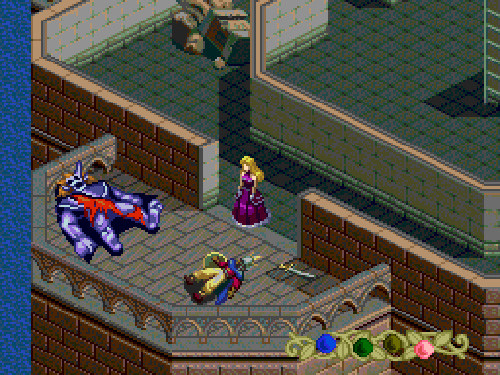
Götzendiener isn't an RPG, however. It's something altogether stranger. As Misa makes her way through the sparsely monitored floors of the demons' castle, everything's arranged from a diagonal viewpoint. This makes the game rather clumsy to play with a standard controller, and Misa's pace is deliberately slow. The game's tributes to Jordan Mechner's Prince of Persia are apparent all about: in the tiled layouts of the palace, in the practical little puzzles that Misa solves, in the way she carefully draws her sword and shifts to a dueling stance when it's time to take on a monster. Prince of Persia was never quite as sluggish as this, though.
Yet Götzendiener seems to realize its limitations, and perhaps they're intentional. Most of the monsters go down easily as long as Misa presses the attack, and she encounters surprisingly few fights for what's supposed to be an action game. There's a point where Götzendiener clicks into place: the empty halls and minimalist soundtrack become haunting instead of irksome, and the game's strange glimpses of the monsters (who are seen worshipping an enormous statue) lead to stranger revelations later in the game. The effect is at once awkward and fascinating, like some precursor to Fumito Ueda's ICO.
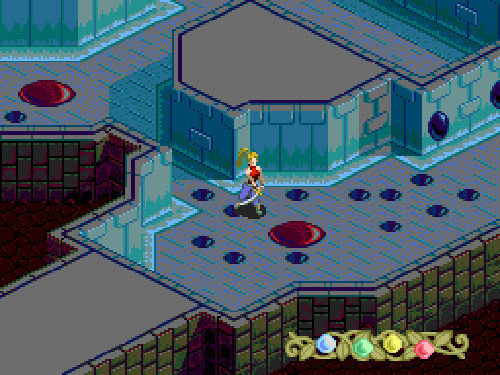
It's a shame that most of Götzendiener's good ideas fall short. The game lasts about an hour (two if you explore plenty), and everything seems curtailed by programming or budgets. Misa learns two spells: one projects fire, one resurrects monsters as sidekicks, and both forms of magic get used only several times in the course of the game. Equally underused are the few tools she picks up and the dozen different breeds of monster she encounters. Everything seems to dissipate just when it gets interesting.
The same goes for Götzendiener's storyline. The game initially subverts the whole idea of princess-saving fantasy violence, but in fact it merely hands off the baton to Misa so she can kill monsters and smash idols in the hero's stead. Between her enemy-reviving magic and the plot twists about the island's creatures, Götzendiener could've taken its premise to much more interesting places. But Misa doesn't go there, and her rapid journey from captive damsel to resolute heroine doesn't let her grow much of a personality. Oh, and she loses her pants just in time for the game's last level.

Götzendiener wouldn't get another chance to explore its concepts. This probably didn't bother Studio Gainax all that much, as the next year brought along Neon Genesis Evangelion. Most of the Gainax talent involved in Götzendiener were part of Evangelion and other things; Takami Akai's worked on more Princess Maker games as well as Banner of the Stars and Gurren Lagann, while Yoh Yoshinari had a hand in Valkyrie Profile, Gurren Lagann, Panty & Stocking with Garterbelt, Little Witch Academia, and some of the prettiest explosions ever animated. Gainax didn't need to sponsor original video games when the latest Evangelion sign-off sold better.
Studio Alex would not enjoy the same success. While the first two Lunar titles won acclaim in Japan and America, things would go sour shortly after the third entry, Magical School Lunar. Studio Alex sued their Lunar collaborators at Game Arts over creative rights, and Game Arts launched and won a counter-suit. This put an end to Studio Alex and any ambitions they might have had for more experiments like Götzendiener.
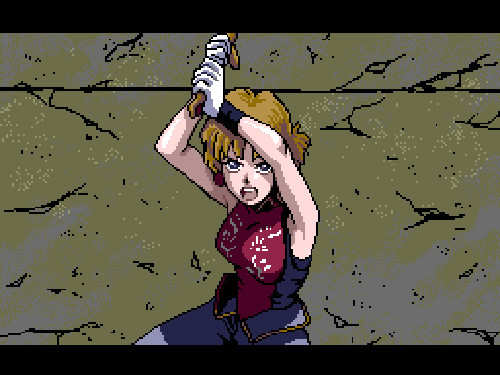
Götzendiener is neither as deep nor as iconoclastically feminist as its first moments suggest, and it's simply too stiff when judged as an action game. It's best appreciated for the potential, for the places Studio Alex might've taken a remake if time and money and lawsuits hadn't worked their foul magic. The game's at its finest in the beginning, when Misa's breakout moment seems the start of something special. That moment will have to suffice for Götzendiener's legacy. It's a short and troubled journey, but it's different in at least one way.
Götzendiener is relatively cheap among PC Engine titles, and you can land a copy for under twenty dollars (which comes out to about ten bucks per hour of playtime). It's not a hard game to understand, as most of the clues are visual.
discuss this in the forum (50 posts) |
this article has been modified since it was originally posted; see change history